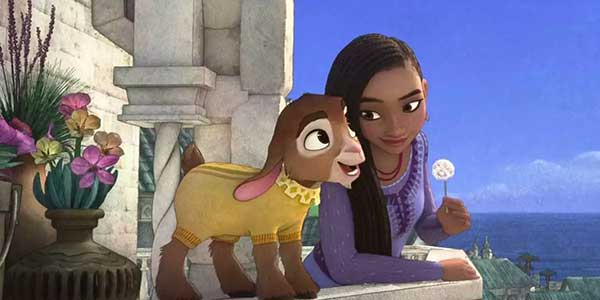Disney’s latest animated feature, Wish, is intended to be a celebration of the company’s legacy, but do its references feel cynical or sincere?
Seconds before my screening of Disney’s latest animated film, Wish, was set to begin, I was treated to a compilation of the legendary company’s greatest achievements over the last 100 years. Over the course of a couple of minutes, dozens of iconic properties were shoved into my face, ranging from beloved animated classics to more recent franchises that the entertainment titan acquired in the last few years. It was a strange spectacle to behold, one that felt both cynical and sincere. On one hand, it could be read as a genuine celebration of everything that Disney crafted over the course of their existence, but at the same time, the presence of films like Avatar: The Way of Water, which, let’s be honest, absolutely no-one associates with the Walt Disney brand, made it feel less like a kid proudly showing off their art project and more like an advertising executive desperate to get me to buy Disney+.
Unfortunately, this feeling never left me as the next hour and a half passed by, and by the time Wish finished, I couldn’t quite figure out if, to put it bluntly, I had just been scammed. See, I went to Wish expecting to see a brand new Disney animated adventure, one that seemingly intended to set a new standard for the company’s animation whilst also celebrating everything that came before it. What I felt like I got instead was a lazy, derivative Disney+ advert that just made me want to watch those past films that I cherish so dearly.
The narrative of Wish, which is an obvious callback to the simpler fairytale stories that populated so many of the Disney films of the 20th century, follows Asha (Ariana DeBose) as she uncovers the dark secrets of the kingdom she calls home, and its incredibly charismatic but also very obviously evil leader, King Magnifico (Chris Pine). The name of the film comes from both Magnifico’s ability to grant people’s wishes, as well as the wishing star who befriends Asha about halfway through, who is apparently meant to be the same one seen in Pinocchio (1940). It’s a forced reference, and also one that’s indicative of just how far Wish is willing to go to call-back to a classic Disney property.
Every reference to, say, Peter Pan (1953) just made me want to watch that significantly better and more magical film. So, I’ve decided to try and figure this out once and for all: do the Disney references that Wish is littered with actually come across as a sincere celebration of the company’s legacy, or do they just feel like a cynical, corporate move designed to make you want to revisit the films of your past?
WAS WISH DOOMED FROM THE BEGINNING?
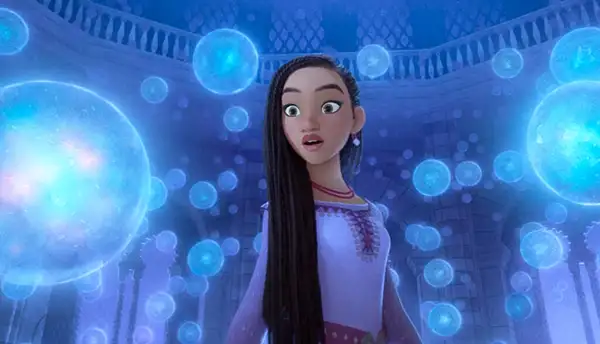
Before we get any further, I do feel like it’s worth posing the question of whether or not a film whose purpose is to simply reference other films can actually be good and feel sincere. It’s a topic that’s come up a lot in recent years, with films like Ready Player One (2018) and Chip ‘n Dale: Rescue Rangers (2022) dedicating a good chunk of their runtimes to references and tributes to other films. The former’s an interesting case in itself, as there are so many references to all kinds of different things scattered throughout it, and these references take on so many different forms that whether or not they feel like a sincere tribute or a cynical easter egg designed to generate “10 things you missed” articles online changes constantly.
Take the sequence dedicated to The Shining (1980) where the characters have to navigate their way through the iconic setting to obtain a key. It uses a backdrop familiar to audiences but utilises it in a completely different way that helps make it feel like more than just a call-back for the sake of it. However, in the same film, you have cameos from characters like Tracer from the video game Overwatch (2016) interrupting big, emotional scenes, in a way that can’t help but feel cynical. The difference between the two scenes is that the former feels like a loving tribute to Stanley Kubrick’s masterpiece, whilst the latter feels like an easter egg shoved into the film without a second thought simply to please fanboys, without any regard for if it actually benefits the flirtatious conversation it’s being put into.
EXAMINING THE DISNEY REFERENCES IN WISH
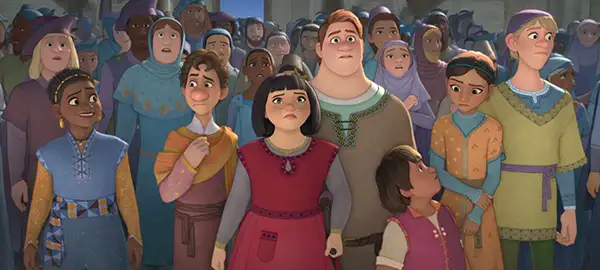
So, using this newfound knowledge, let’s examine Wish and the many references found within it. One of the first to jump out to me was the seven friends of the film’s main protagonist, Asha (Ariana DeBose), who are obviously intended to mirror the seven dwarves found in Disney’s first-ever feature, Snow White and the Seven Dwarfs (1937). One of them is constantly sleepy, one literally exclaims how grumpy he is, etcetera. It’s a cute easter egg on paper, but in execution, what we end up with is a bunch of characters who end up contributing absolutely nothing to the film. Their mere existence means that the ones who do actually get something to do in the story end up feeling incredibly thin because their lines have to be given to the ones who have significantly less to do, just so Wish feels justified including them at all. It’s a clunky reference that hasn’t been properly thought through, and as a result, it ends up hurting the film.
It’s also one that took me out of the film almost immediately, as my mind took a step back from focusing on the plot to instead count how many friends Asha has, and try to recall the personality traits of the seven dwarves. You know what’s funny? By the end of all that, I really wanted to go back and watch Snow White, a film that, to this day, still feels magical and unique. How would one go about watching Snow White in 2023? Well, by using Disney+ of course! So, if Disney’s secret plan was to make me want to use their streaming service more, they definitely achieved that, but why is Wish, their latest theatrical animated release, serving the same purpose as those terrible Simpsons shorts that they keep making?
Throughout Wish, there are all sorts of other references for Disney fans to point and gawk at. There’s a small conversation between a deer named Bambi and a bear named after Honest John from Robin Hood (1973), King Magnifico at one point makes a Mary Poppins (1964) joke, and for whatever reason, there are several references to Peter Pan, which I have to assume is a childhood favourite among those behind the scenes. None of them are obnoxious to the point of stopping the plot, but what they are is incredibly frequent, and when you pick up on one, you pick up on the next one, and the next one, until all you’re thinking about are the references. Unfortunately, it’s all incredibly distracting.
ARE WISH’S DISNEY REFERENCES SINCERE?
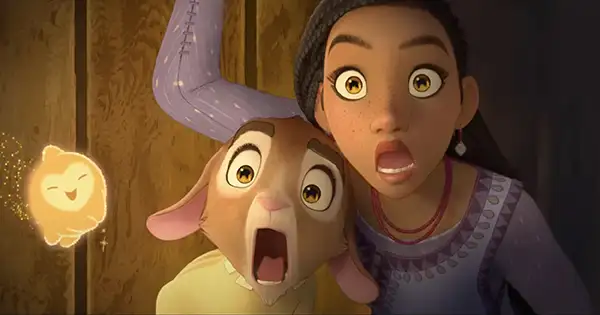
Now, there’s certainly an argument to be made that these references are all sincere and that they’re there to simply celebrate Disney’s 100-year legacy. That’s Wish’s purpose, isn’t it? To serve as a worldwide celebration of all things Disney. After all, it’s intended to be the origin story for the wishing star seen in several classic Disney films, so obviously it was never meant to be its own thing from the beginning. Perhaps we should stop seeing it as a film, and more like a birthday party, one that costs about £12.50 to attend. One that is full of family members who can’t stop reminiscing about childhood memories, and when things were better. Why should we make something original and interesting now, when we could instead just take a second to remember all the good things that happened years ago?
My problem then is that Wish doesn’t commit to this idea of simply being a celebration. This is obviously meant to be an original Disney film, none of the marketing touches upon the references and it doesn’t end by turning to the audience and saying, “This is the wishing star seen in such films as Pinocchio (1940)”. I’m sure a kid who has never seen a Disney film before could theoretically not pick up on any of the references and thus see this as a completely standalone film, not meant to be celebrating anything. That’s great, sure, but that’s obviously not the target audience that Disney is trying to reach here. They want the cinema to be filled with people who have grown up consuming all things Mickey Mouse, who know this company like the back of their hand, who will gawk at every last reference. Yet, at the same time, they need to be able to market it as its own thing, so they’re not putting off any possible audience members.
WHY WISH ULTIMATELY FEELS CYNICAL
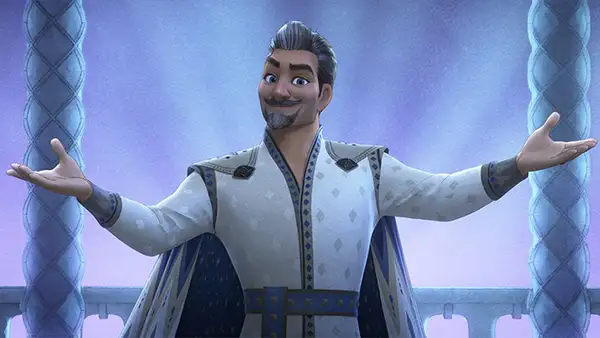
So what you end up with is a film that is half-celebration, half-standalone-story, but can never commit to either idea and so just ends up feeling unoriginal and lazy. It feels like it’s meant to evoke classic Disney princess films, but it’s full of modern tropes and slang, and every song feels like they’ve been pulled from Dua Lipa’s latest album. Its characters feel cliché and its animation feels like an effortless attempt to hop onto the 2D/3D-hybrid trend started by Spider-Man: Into the Spider-Verse (2018). As a result, its references feel less like an authentic celebration of the things we love, and more like a desperate, cynical attempt to engage the audience, and either get an easy laugh out of them or give them something else to discuss in the car on the way home.
If Wish genuinely felt like an original story that could easily stand on its own two feet with every reference removed, then maybe its celebratory nature would start to feel sincere. As is though, it just feels like a corporate circle-jerk, a product designed purely to make you want to consume more of Disney’s products. It doesn’t build on the references, it doesn’t give us a new, interesting spin on anything, it simply just reminds us they exist, so that we can think about how much we would rather be watching them instead, so that when we go home, we hop onto Disney+ and immediately start playing that film. Wish isn’t a movie, it’s an advert, and that’s why its references feel so annoyingly cynical.
Wish is now available to watch globally in theaters.

